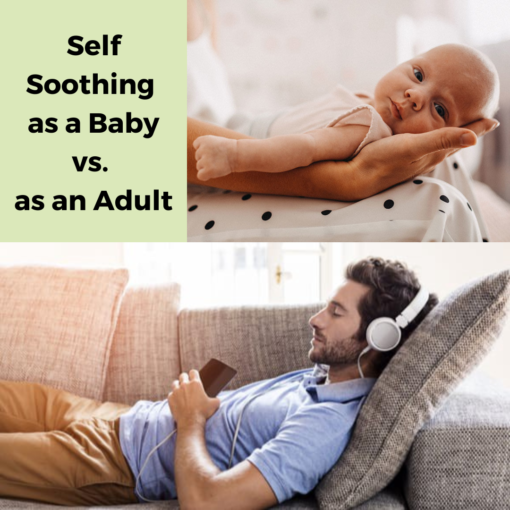‘Self-soothing’ is our ability to settle ourselves when we are upset. The best time to learn this skill is in infancy when we have our parents to help us. How? Well in the early weeks, mums and dads may rock us, sing to us, cradle us and (hopefully) watch our baby eyelids close as they put us to bed. But what happens after that? That’s often where the blankie, dummy, teddy or another comfort item is introduced. So you’re saying “I already know that!”. But WHY are they so important?
At some time when your little cherub has been put to bed, they won’t fall asleep and you will leave the room. You won’t always be there the instant they want or need you for comfort. You are allowed to have your own down time too!

Did you know that our mental health as an adult depends on learning the skill of self-soothing in infancy?
It’s at this age that babies realise you aren’t a physical extension of them. This is a big deal for them, and babies don’t like it! They get upset. A comfort item like a dummy, acts in a way that helps the baby to settle itself – to ‘self-soothe’. As these objects are always there in the cot, they act in place of a parent until you return. They’re called ‘transitional objects’ because they help the baby make the transition from you to another ‘always there’ comfort item.
Now it’s essential that we learn the skill of ‘self-soothing’ in infancy because our mental health as adults depends on it. We ALL continue to need someone we love around us to comfort us when we’re upset, tired or sick.
It’s called attachment.
Just like the baby in a cot, we have an attachment figure. This however tends to be another person as an adult, instead of a dummy or teddy. This attachment person isn’t always there, and if we’re feeling stressed, find ourselves in a negative mindset, or are feeling down, we are up the proverbial creek if we can’t self-soothe. It’s here that we’re prone to substitute our own dummies with cigarettes, alcohol or drugs – often excessively. When feeling overwhelmed the cry for “someone to be here – I can’t do it myself”, can result in self-harm.
Many people today have never learnt to self-soothe, and it comes through as anxiety or stress.
How to Learn Self-Soothing as an Adult
- Practice Conscious Breathing – as soon as you feel stressed, take a few deep slow breaths. Breathing helps you expel tension, so it doesn’t lodge in your body.
- Positive Self Talk – tell yourself, “This is a temporary situation. I will find the best way to handle this. Everything will be okay.” Don’t let negative, fear-based voices get in the way of consoling yourself with kindness.
- You are Larger Than Anxiety – when you notice yourself feeling stressed or overwhelmed, tell yourself, “I am not this emotion. I can centre myself.” Realising you are larger than the feeling, will relax you and gives perspective.
- Hand on Heart – just as mothers console their babies by patting their chest, you can put your hand over your heart to calm yourself. The heart is the centre for love. When you touch it, biochemicals called endorphins are sent throughout your body, which makes you feel love.
- Practice Self-Compassion – your thoughts make a difference. Be kind and avoid putting yourself down. Remember to show yourself compassion when you’re stressed or emotionally distraught. Replacing negative thoughts with positive ones enhances your well-being.
- Take Some ‘You’ Time – listen to some music, go for a walk in nature and get some fresh air, or have a warm bath. Take some time for you to feel calm and clear your mind.
Written by Rebecca Deane – Clinical Psychologist – creatingchange.net.au

